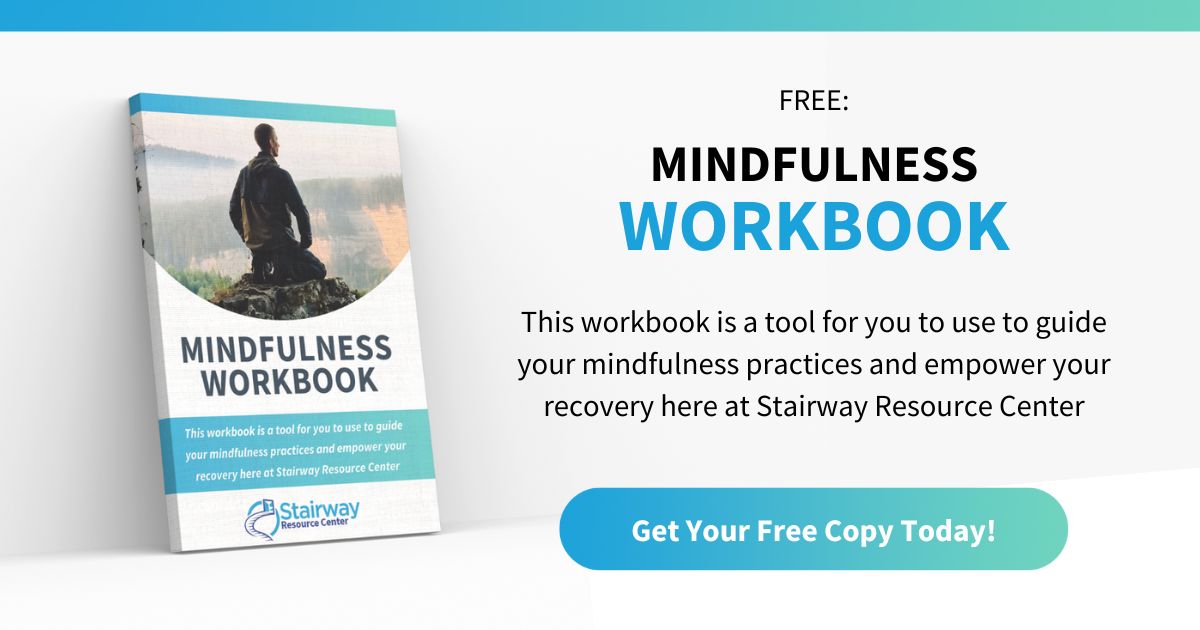Mindfulness in psychotherapy refers to a state of being aware of each moment and, in each moment that occurs, being aware of the world around you via thoughts, feelings, connections, and sensations. An important aspect of this moment-to-moment awareness is removing your judgment regarding those things rather than analyzing your thoughts and feelings for right and wrong. The goal is for mindfulness to be a state of being rather than a state of analysis.
Mindfulness can incorporate a number of calming activities to help your mind slow down and process information in the present moment rather than focusing on issues from the past or events approaching in the future. Practices like yoga or tai chi are very useful for achieving this and are common mindfulness practices. However, the most commonly associated practice is meditation.
What Is Evidence-Informed Mindfulness?
Evidence-informed mindfulness techniques are created with evidence from clinical studies in mind and use the slowly accumulating knowledge regarding mindfulness to ensure practices have their full effect. For example, research shows that practicing mindfulness has been shown to create change in neural mechanisms, which can improve self-regulation. Mindfulness not only allows you to stay in the moment but impacts your self-awareness and how easily you appreciate and accept that moment. This, in turn, allows better regulation of the self and can provide better coping and cognitive function.
Mindfulness techniques use the cognitive benefits of mindfulness to help those trying to recover from substance misuse, and have seen several clinical benefits for those suffering from substance use disorders, and have many potential benefits based on mental and physical improvements mindfulness provides.
The Function of Meditation
Meditation can be an extremely helpful way to promote mindfulness and get into the habit of existing in a mindful state. However, meditation and mindfulness are not the same things, and it’s important to work towards mindfulness outside of meditation. Where mindfulness provides a state of present awareness, meditation provides you with a moment of space to explore that present awareness. Beginning with mindfulness meditation is a great way to establish a mindful state, which in turn provides a number of benefits, including improved memory and emotional control. These benefits can be remarkably useful for approaching substance use disorder recovery.
You begin mindfulness meditation by focusing your awareness and attention, followed by monitoring everything around you. Focusing can be achieved with breathing exercises, intentional movements, or even a certain sound that anchors you in the moment and helps quickly reduce stress. Controlling your attention can be difficult for some, but it’s something that can be improved with continued mindfulness practices.

Once you feel that your attention is well-anchored, begin the monitoring process. When you monitor openly, you become aware of all the sensations around you, physically and emotionally. Ground yourself in the physical world and pay attention to your thoughts and emotions, as well as how they are shaped by the physical world.
[colorsection bgcolor=”dkbluebg”]“Mindfulness can be an effective tool for working through substance use disorder and preventing relapse.”[/colorsection]
Mindfulness in Addiction Recovery
There are a number of ways mindfulness and mindfulness meditation can help those dealing with substance dependency. The idea of staying in the moment and focusing on your present thoughts and feelings without judgment can help address dependency triggers, but there are more concrete benefits to mindfulness. For treating substance use disorders, mindfulness practices have been shown in clinical trials to reduce cravings and lessen the risk of substance use. The additional mental health improvements can also help reduce the risk of substance use as well as minimize the negative emotions and stressful situations that can lead to relapse.
How Different Types of Mindfulness Aid Recovery
In the late 20th century, researchers developed methods to improve mindfulness in therapy and recovery, including mindfulness-based stress reduction (MBSR) and mindfulness-based cognitive therapy (MBCT). MBSR uses the focus and body awareness techniques listed above, in addition to yoga and in-depth exploration of behavior and thought patterns, to reduce stress and worry. MBCT puts these practices into place in a clinical behavioral cognitive therapy setting.
These practices can be used for behavior intervention and reducing emotional distress associated with mental health disorders. The idea behind these practices is that mindfulness will eventually become a way of being, so meditation isn’t needed in order to practice mindfulness and experience benefits successfully. The success of MBSR and MBCT led to the creation of mindfulness techniques aimed at helping people recover from substance use disorders. These include mindfulness-based relapse prevention (MBRP) and mindfulness-oriented recovery enhancement (MORE).
MORE combines mindfulness methods and cognitive-behavioral therapy as a component of substance use treatment. It uses mindfulness to encourage people struggling with substance use disorder to become aware of stressors or substance misuse cues, process craving and stress through their senses, and use mindful meditation techniques like focusing on breathing. The goal is to exert control over stressors, pain, and cues for substance dependency and take cognitive control of healthy growth and management. Then, through reappraisal, mindfulness is used to restructure negative cognitive thoughts and emotions that lead to substance use and create better coping behaviors.
MBRP uses similar techniques within the cognitive behavioral therapy setting in conjunction with standard relapse prevention tools. Together, this toolkit can help people who have begun recovery from SUD stay in recovery and resist relapse. Both MORE and MBRP focus on promoting health, wellbeing, and enjoyment of life through the self-regulation that mindfulness provides.
While MORE and MBSR both specify an eight-week mindfulness period, it’s likely that in order to produce the best results for substance use recovery, more time will be needed. It’s also likely that additional twelve-step meetings, individual therapy sessions, group therapy sessions, and other aftercare will be needed. This is to reinforce the cognitive state of mindfulness and ensure lasting benefits.
Benefits of Evidence-Informed Mindfulness
The benefits of mindfulness are what make it a useful, evidence-based technique for substance use recovery. You can use evidence-based mindfulness for recovery, as well as to generally improve mental and physical well-being.

[one_half]
[su_note note_color=”#eff4f3″ radius=”5″]
Stress Reduction
Therapy based on mindfulness and mindful meditation has been shown to reduce stress and has a positive effect on the symptoms surrounding mental health disorders. Mindfulness can reduce anxiety, depression, and distress and generally improve emotional and mental health.
[/su_note]
[/one_half]
[one_half_last]
[su_note note_color=”#eff4f3″ radius=”5″]
Better Focus
Mindfulness meditation correlates to improved attention span and fewer issues with distractions. Conversely, people who claimed to be unaware of mindful meditation and didn’t consider themselves to be mindful had lower attention spans and flexibility.
[/su_note]
[/one_half_last]
[one_half]
[su_note note_color=”#eff4f3″ radius=”5″]
Improved Cognitive Flexibility
Because mindfulness encourages focus in the moment, many who practice it become more self-observant. This change in thinking allows better flexibility in cognitive pathways, allowing the brain to change previous thoughts or ideas and create new pathways based on new information. In this way, mindfulness allows you to think flexibly. This flexibility also provides adaptive reactions to negative or stressful circumstances, making it a useful tool in recovery.
[/su_note]
[/one_half]
[one_half_last]
[su_note note_color=”#eff4f3″ radius=”5″]
Improved Emotional Regulation
Maintaining yourself in the present moment through mindfulness has also been shown to improve your emotional regulation and decrease emotional reactivity. Just as mindfulness allows you to disengage from prior methods of thinking, it can help you disengage from emotionally distressing images and regain focus.
[/su_note]
[/one_half_last]
[one_half]
[su_note note_color=”#eff4f3″ radius=”5″]
Reduced Chronic Pain
Pain management requires several modes of treatment. However, mindfulness has been shown to reduce pain at a similar level as cognitive behavioral therapy.
[/su_note]
[/one_half]
[one_half_last]
[su_note note_color=”#eff4f3″ radius=”5″]
Better Working Memory
Practicing mindfulness also leads to better working memory over long periods of high stress. It has been noted to help improve the working memory of military groups with PTSD.
[/su_note]
[/one_half_last]
[one_half]
[su_note note_color=”#eff4f3″ radius=”5″]
Lower Rumination
A part of mindfulness is staying in the present, worrying less about the coming future, and avoiding constantly rehashing past issues. It makes sense that mindfulness would lead to reduced rumination and a general decrease in negative mental health practices.
[/su_note]
[/one_half]
[one_half_last]
[su_note note_color=”#eff4f3″ radius=”5″]
Fewer Sleep Disorders
There are several negative health impacts people experience from sleep disorders. However, mindfulness practices may help to improve sleep. In addition to the physical benefits gained directly from mindfulness, you may also see physical health improvements from better sleep.
[/su_note]
[/one_half_last]

Are There Risks to Mindfulness?
While there are a number of health benefits to mindfulness, there are potential risks to more extreme versions of mindfulness. Mindfulness works best when it is sustained and adheres to evidence-based practices, creating natural and gradual cognitive change. The risks of non-evidence-based mindfulness aren’t well documented, but some high-risk or high-intensity mindfulness may lead to worse mental health. This may occur because a high-intensity focus on cognition may cause distress for those who are more vulnerable.
Though uncommon, it’s important to be aware of these potential risks. The goal of mindfulness is to address those negative states of being by focusing on positive feelings and experiences. Mindfulness is supposed to be uncomfortable as you address your feelings and thoughts without judgment, but it shouldn’t cause you harm. Stick to evidence-based practices recommended by a professional substance use disorder treatment provider.
Maintaining Safe Mindfulness
There are several methods to create safer mindfulness that improves health rather than harms it. Many of the methods discussed, like mindfulness meditation, are low-intensity and allow you to focus your attention and anchor yourself on the present moment. Mindfulness meditation, whether practiced alone or as part of a treatment program, allows you to bring awareness to your emotions, thoughts, and physicality and help you determine your response to the world around you.

Slightly higher-intensity methods of mindfulness, like MBSR, MBCT, MBRP, and MORE, are also unlikely to cause harm, especially when they are conducted by well-trained individuals. Though it isn’t always fun to focus on the things that cause stress, it often results in growth, and guidance can help participants work through those issues. As you may suspect, it’s important that the person guiding you through your mindfulness practice is qualified to teach and oversee the treatment.
Your own mental state can also have an impact on the safety of your mindfulness practice. As mentioned, negative mental health states, such as anxiety, depression, or psychosis, can affect how mindfulness works. While this doesn’t mean mindfulness is not advised for those experiencing mental health conditions, it’s crucial to be sure the professional guiding you through your treatment is aware of your needs.
Further Resources for Substance Use Recovery
Mindfulness can be an effective tool for working through substance use disorder and preventing relapse. However, you’ll need to work with a skilled therapist throughout the process. In addition, developing a supportive community can help you ensure you’re effectively using the tools provided.
Stairway Resource Center is staffed with a group of mental health professionals who share a focus on holistic treatment that employs both evidence-based mindfulness and neuroscience to achieve recovery. If you or a loved one are struggling with a substance use disorder, browse our many resources for mental health recovery.


